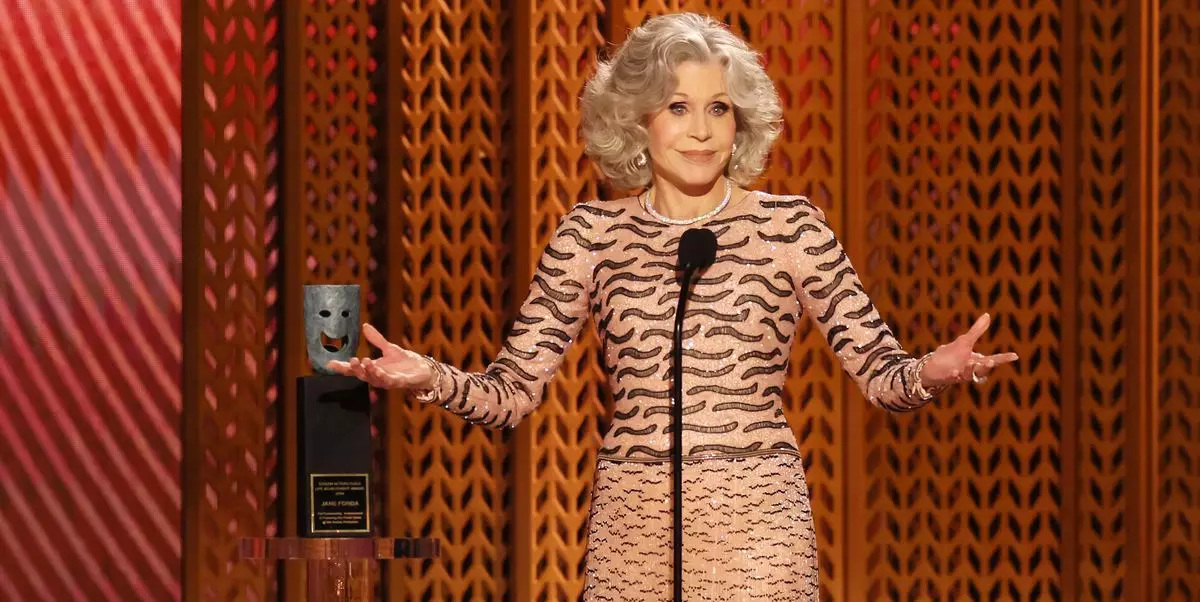At the recent Screen Actors Guild (SAG) Awards, Jane Fonda, the renowned actress and fervent activist, received the prestigious 60th Life Achievement Award, greeted by a standing ovation from a visibly enthusiastic audience. Fonda’s remarks resonated deeply, recalling a lifeline that transcends age and the traditional notions of professional timelines. At 87, she cheekily declared, “I’m not done,” presenting herself not merely as an enduring figure in Hollywood but as a vibrant force ready to confront new challenges.
Her acknowledgment of being a “late bloomer” serves as a poignant reminder that one’s journey in life and career is profoundly unique. Fonda shared her own narrative of stepping back from the spotlight only to return at 65—an age often deemed past the prime of an actor’s career. She characterized her comeback as initially unconventional but went on to achieve critical acclaim, including a successful movie in her 80s. Through humor, she entertained the notion of performing her own stunts in an action movie at age 90, showcasing her refusal to conform to the linear progression laid out by societal expectations.
Fonda took her moment at the podium not only to reflect on her past but to galvanize the acting community around the essential value of empathy. Her reminisces of the 1940s and 1950s—an era when women were often silenced—highlighted the pivotal role acting played in channeling her inner strength. She articulated how portraying complex, often angry women equipped her to find her voice in a world that had historically tried to suppress it.
The actress emphasized the importance of unions like SAG-AFTRA, proclaiming that “community means power.” In an age where workers’ rights are increasingly under attack, Fonda’s reflections resonated especially loud. She reminded her peers that actors, unlike many professions, manufacture something intangible yet vital: empathy. This call for understanding others—to explore multidimensional characters—reinforces the idea that true artistry lies in connecting with the human experience at profound levels.
Fonda candidly addressed the growing misappropriation of the term “woke,” which has been weaponized to malign movements advocating for diversity and inclusion. With a defiant tone, she declared, “Empathy is not weak or ‘woke.’” In doing so, Fonda affirmed that caring for others is intrinsic to one’s humanity rather than a political statement. This unapologetic stance against the co-opting of language to diminish social justice efforts is crucial, especially for those in the public eye who possess the power to influence and inspire.
In her closing remarks, Fonda framed the current social climate as one of significant urgency, labeling it a “documentary moment.” She called for courage amidst crises, referencing icons like Norma Rae and Karen Silkwood, who fought for workers’ rights and justice. Her entreaty to remain connected, to champion the vulnerable, and to cultivate hope for a better future echoed the sentiments of countless individuals navigating societal upheaval.
Jane Fonda’s speech was more than just an acceptance address; it was a manifesto calling for collective action and responsibility. By reminding us that love and beauty endure even in tumultuous times, she articulated a vision that is necessary in today’s world. Her insistence that we must enable an inspiring vision of the future underscores her commitment not only to her craft but also to societal betterment.
In a time where division and isolation seem prevalent, Fonda’s words serve as a clarion call to unite in empathy. It is crucial to remember the power inherent in storytelling—how narratives can bridge gaps and foster understanding. As she poignantly noted, we must act now, for this moment is not a rehearsal; it is the stage upon which our legacies will be written. Through her leadership, Jane Fonda continues to inspire, engage, and nurture the values that are so essential for humanity’s progress.

